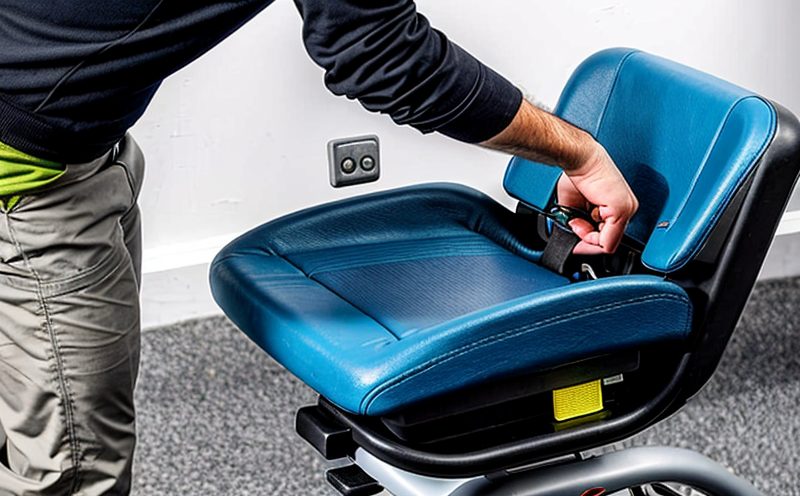Assessing the performance of seat adjustment mechanisms under stress
Assessing the Performance of Seat Adjustment Mechanisms Under Stress Why It Matters for Businesses
In todays fast-paced and increasingly safety-conscious world, manufacturers are under pressure to produce vehicles that meet stringent regulatory requirements while maintaining exceptional performance. One critical aspect that is often overlooked in the design and development phase is the seat adjustment mechanism. This seemingly simple component can make all the difference between a comfortable driving experience and a potentially life-threatening one.
At Eurolab, we specialize in providing laboratory services that help manufacturers like yours assess the performance of seat adjustment mechanisms under stress. Our team of experts uses cutting-edge equipment to simulate real-world scenarios, identifying areas for improvement and ensuring compliance with regulatory standards.
What is Assessing the Performance of Seat Adjustment Mechanisms Under Stress?
In simple terms, assessing the performance of seat adjustment mechanisms under stress involves testing the mechanical components that enable seats to move, adjust, and return to their original position. This includes evaluating the mechanisms resistance to wear and tear, its ability to withstand various loads, and its overall reliability.
Why is Assessing the Performance of Seat Adjustment Mechanisms Under Stress Essential for Businesses?
The importance of assessing seat adjustment mechanisms under stress cannot be overstated. Here are just a few reasons why this laboratory service is crucial for manufacturers
Enhanced Safety A well-designed and robust seat adjustment mechanism is critical to ensuring occupant safety in the event of an accident. By evaluating the performance of these components, manufacturers can identify potential weaknesses and make necessary improvements.
Improved Comfort A comfortable driving experience is no longer a luxury; its a necessity. By testing seat adjustment mechanisms under stress, manufacturers can optimize their designs for improved comfort, reducing driver fatigue and enhancing overall vehicle appeal.
Reduced Maintenance Costs Poorly designed or inadequate seat adjustment mechanisms can lead to costly repairs and replacements down the line. By assessing performance in the lab, manufacturers can minimize maintenance costs and reduce downtime.
Compliance with Regulatory Standards Meeting regulatory requirements is no easy feat. By working with Eurolabs laboratory services, manufacturers can ensure compliance with industry standards, avoiding costly fines and reputational damage.
Benefits of Using Assessing the Performance of Seat Adjustment Mechanisms Under Stress
At Eurolab, our laboratory services are designed to provide manufacturers with a comprehensive understanding of their seat adjustment mechanisms performance. Here are just a few key benefits of using our services
Early Detection of Design Issues Our team uses advanced equipment and testing protocols to identify potential design flaws before they become costly problems.
Cost-Effective Solutions By identifying areas for improvement early on, manufacturers can avoid expensive redesigns and repairs down the line.
Improved Product Reliability Through rigorous testing and evaluation, we help manufacturers develop seat adjustment mechanisms that are built to last, reducing the risk of premature failure.
Enhanced Competitiveness Manufacturers who work with Eurolabs laboratory services gain a competitive edge in the market by offering vehicles with improved safety features, comfort levels, and overall performance.
How Does Assessing the Performance of Seat Adjustment Mechanisms Under Stress Work?
Our team at Eurolab uses state-of-the-art equipment to simulate real-world scenarios, including
Dynamic Testing We subject seat adjustment mechanisms to various loads and stresses, simulating actual driving conditions.
Static Testing Our experts evaluate the mechanical components resistance to wear and tear under static loads.
Environmental Testing We test seat adjustment mechanisms in extreme temperatures, humidity levels, and other environmental conditions.
Frequently Asked Questions
Here are some common questions we receive about our laboratory services
Q What types of vehicles can be tested for seat adjustment mechanism performance?
A Our team works with manufacturers from a wide range of industries, including automotive, aerospace, and more. We can test seat adjustment mechanisms for various vehicle types, including cars, trucks, buses, and even aircraft.
Q How long does the testing process typically take?
A The duration of our laboratory services varies depending on the scope of work and the specific requirements of each project. However, most tests can be completed within a few days to a week.
Q Can you provide customized testing protocols for our specific needs?
A Absolutely! Our team works closely with manufacturers to develop tailored testing protocols that meet their unique requirements.
Conclusion
Assessing the performance of seat adjustment mechanisms under stress is an essential step in ensuring vehicle safety, comfort, and overall performance. At Eurolab, we offer a comprehensive range of laboratory services designed to help manufacturers like yours achieve regulatory compliance, reduce maintenance costs, and enhance competitiveness.
Dont wait until its too late contact us today to learn more about our laboratory services and how they can benefit your business. Together, lets create safer, more comfortable vehicles that set the standard for excellence in the industry.




